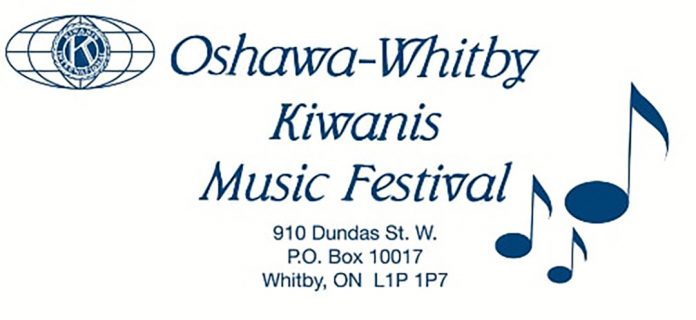The Oshawa-Whitby Kiwanis Music Festival started on Feb. 28,1972. The 51st annual festival runs this year from April 25 – May 6, but since its inception the event has evolved.
The festival is put together by the Oshawa Kiwanis Club and as a non-profit it manages to fund itself through sponsorships, donations and fundraisers. The different ways they are funded tie them back to the community and thus they have made themselves a presence in Oshawa and Whitby for the last 50 years.
Prior to COVID-19 the event attracted as many as 1,500 applicants, from Durham Region and surrounding areas such as Cobourg and Toronto, including many entries from students and schools, according to board member Tina Schaaf. Participants played in vocal and instrumental competitions where they were assessed by a panel of musical adjudicators. Performing in local venues, often churches, the festival took place over a two-week period and featured kids putting on live performances to move on to the playoffs.
But when COVID-19 arrived in March 2020, like many other organizations, a shift to online had to happen quickly. The Oshawa-Whitby Kiwanis Music Festival was able to not only successfully make the online shift but also make it while keeping a strong number of participants, according to Schaaf.
At the start there was a hesitation to formatting the festival for an online model.
“At first I thought I’m not doing it, I am not doing it online I just couldn’t get my head around it,” says Schaaf. After speaking to another music festival operator in the province, she found out the Oshawa-Whitby Kiwanis festival was one of a few who were attempting it online.
Now, although COVID-19 restrictions have been relaxed, this year’s festival continues online. Participants submit recorded work online and adjudicators assess it.
“At first people didn’t like this whole Zoom and now we’re all used to it, it’s not that bad,” says Schaaf. “You’re dealing with hundreds of people so there’s always issues.”
Pre-COVID-19, Schaaf travelled to the venues during the two-week period to make sure things were running smoothly and to handle office duties. During the time the festival was in-person she was responsible for keeping the large festival on track which with the multiple venues was a difficult job, she says.
Ted Warren has been involved with the festival since 2003. He worked in the advanced piano class up until the pandemic. His involvement with music began with a church choir in England when he was seven years old. He has also served as president of the Durham Youth Orchestra for some time.
“The playoff for the senior and advanced piano was always a big moment because you had some real talent there,” said Warren.
Historically, these music festivals could be found all over Ontario. Currently, due to dwindling numbers of Kiwanis groups along with the pandemic, Oshawa holds only one of three festivals in Ontario, in the COVID-19 era, according to Schaaf.
The need for community organizations to hold events during the pandemic because of restrictions placed on in-person recreational gatherings has been felt. The festival gives many young musicians and performers the outlet to showcase their talents.
The benefits also go beyond community performance. Jim Nesbitt is a retired educator who joined to work in the festival in 2003.
“For many artistic kids that are building a portfolio for their tertiary education, where they may want to get into a music program it’s important for them to take part in festivals,” Nesbitt says.
He still believes the in-person experience would be beneficial.
“Not being live, being virtual takes some of the pressure away,” says Nesbitt. “If a kid is going into the performing arts certainly they need to be able to perform when the pressure is on.”
The possibility of going back to live shows is still on the table. This year is set on virtual performances but as pandemic-related restrictions ease, future shows could be in-person.
Schaaf sees future festivals playing out differently, with some online components possibly remaining. The virtual festivals have shown some things can be run differently to lighten the heavy workload.
At this point it is still uncertain what the future holds, but one thing we know is the festival will find a way and the show must go on.




